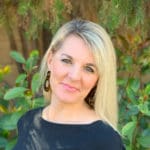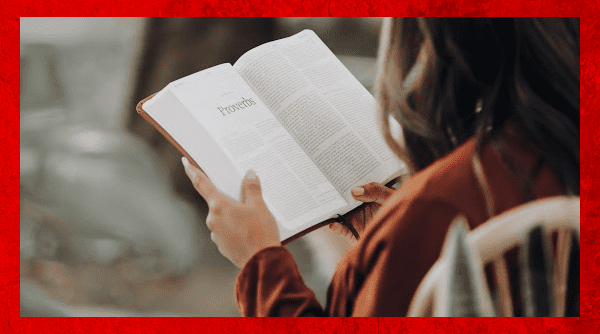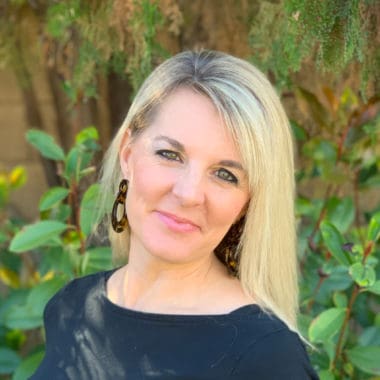Part 34 of This Present Paradise
A Series of Reflections on St. Elizabeth of the Trinity
(Start with part 1 here.)
“The force and power of the word of God is so great that it stands as the support and energy of the Church, the strength of faith for her sons, the food for the soul, the pure and everlasting source of spiritual life.”
(Dei Verbum, 21)
I was a high school student, visiting the campus of Franciscan University with my father. As we made our way to noon Mass, he stopped and pointed out a young man surrounded by students, talking animatedly in the courtyard in front of the Christ the King Chapel. “That’s Scott Hahn,” Dad said. “Be sure to take a theology class with him.”
Dad had known the young teacher from his time studying in Milwaukee, our home town—the place where Professor Hahn had entered the Church not too many years before. I made a mental note, and a year later, after I’d been accepted as a student, navigated through the chaos of registration day and found a good-natured old friar who was taking theology course requests. “I”d like to take the Old Testament class with Professor Scott Hahn,” I said, and he obligingly wrote down my name.
Not long after, I followed the directions on my schedule to the classroom listed. Young people milled around the room, unable to find enough seats. Finally, our professor arrived, shaking his head. “Follow me,” he said. “We’ve got to move to another building with a bigger room. They accidentally took registrations from freshmen for my class—that wasn’t supposed to happen.”
We trooped behind him across campus and wound our way through another, newer building and into a larger room. I found a seat in the front.
Professor Hahn—not yet “Doctor”—began in prayer, opened his Bible, and started to teach. I sat mesmerized as he spoke, realizing within a few moments that life might never be the same. A cradle Catholic, I had always—by the grace of God—loved my faith. But that day I realized how little I actually knew about it. I began to see a story unfold, a story which began in Genesis and continued in the Church and of which I was an integral part. I saw the story of salvation—a beautiful story which I had before only consumed in bits and pieces. Now, we were going to start from the beginning. I wanted as much of that as I could get. Within a few weeks, I switched majors from English to Theology. “I can study English anywhere,” I reasoned. “But I can only get this while I’m here.”
I never looked back. Four years flew by, four classes with the soon-to-be world–renowned Dr. Hahn, a Bible study with his wife Kimberly—I soaked it all in. I’m convinced: there are no accidents, and I was absolutely supposed to be in that class at that time. Even then, it would be years before a regular rhythm of daily scripture reading became my morning routine, but that class was a bigger morning: a dawn of desire to truly understand, through the Bible, what God has done, is doing, will do.
Among Catholics now, there is a renewed interest in studying the Bible, a breaking open of the Word—our Church now really is kind of collectively on the road to Emmaus. Many of us gather in bible studies to dive deep into particular books and passages—and simultaneously stand back to gaze at the unfolding of a breathtaking story with Christ as the culmination. We feel our hearts burning within us like the disciples whose conversation with the Risen Christ opened their eyes for the first time to the fulfillment—in Him—of the passages they had memorized as children. This renewal is a sure sign of the continuing work of the Holy Spirit in the Church.
But in France at the turn of the century, that wasn’t the case. Most people didn’t have a Bible or even access to the entirety of Scripture. Elizabeth heard Scripture at Mass, she prayed with it in the Liturgy of Hours, she possessed a collection of passages from the New Testament, but she never had an opportunity for biblical exegesis or study. She never had what I’d been given as a young student: a chance to start at the beginning and read my way through salvation history with commentaries and histories and wise professors. Still, what she lacked in access and resources she made up for with a sort of supernatural aptitude for getting to the heart of Scripture. She read reflectively, meditating on the words, making them her own, applying them and allowing herself to be transformed. She treasured the inspired writings, pondering them in her heart like Our Lady. And she had the best teacher: she had the Holy Spirit.
She led her own little Bible study, too, in a sense: she shared what God unpacked in her maturing soul with all of those who unfolded her letters and read scripture-based wisdom such as:
“Do you remember that beautiful passage from the Gospel according to St. John where Our Lord says to Nicodemus: ‘Truly I say to you, if one is not born anew, one cannot see the kingdom of God? Let us therefore renew ourselves in the interior of our soul, ‘let us strip off the old and clothe ourselves anew, in the image of Him who created him” (St. Paul). That is done gently and simply, by separating ourselves from all that is not God. Then the soul no longer has any fears or desires, its will is entirely lost in the will of God, and since this is what creates union, it can cry out: ‘I live no longer I, but Christ lives in me.’” (L 224) This phrase resonated with her deeply—she recognized it as exactly what was happening within her.
Her own words so naturally mingled with the words of St. John and St. Paul, it was as if there was an infusion of the fruit of their words—of the Word—into the fresh spring of God’s grace–she called herself a “little vase at the source, the Fountain of life, so that later I can communicate it to souls…” (L 191) And that’s exactly what she did; effortlessly she wove Scripture, and the depth of meaning within it, into her letters, and later, her beautiful retreats. It was just another way she was ahead of her time, or really, outside of time altogether. She lived totally in the intersection of linear time and the eternal now where God enters our world and works to restore everything to Himself and under the Headship of Christ, the Eternal Word.
In particular, she came to love St. Paul, who had become a sort of spiritual father to her, whose “beautiful letters” she admitted to “studying with much enjoyment.” (L 230) She shared his words freely and with the assurance of one who had totally experienced in her own soul everything he wrote. “I am going to give you my ‘secret’: think about this God who dwells within you, whose temple you are; St. Paul speaks like this and we can believe him,” she wrote with a simple, endearing confidence. (Letter 249)
The real secret was that she could freely interpret and make accessible to others the mysteries of Scripture because she had contemplative knowledge which came from the exact same source. Interiorly, she sat long hours listening at the feet of the same Christ who walked in the Gospels. She was the constant, receptive companion of the same Christ who had appeared to St. Paul. She deeply understood His voice in the sacred pages because she had heard it in the depths of her heart, in the hidden place she shared with Him.
The insight and illumination she had about the sacred passages came directly from the intimacy she had with their divine Author.
And it went both ways. Each passage allowed her to penetrate in her prayer a little more of the mysteries of the One she loved above all else, inviting her to know and love Him more and more.
St. Augustine, at the very threshold of his definitive conversion point, heard the heavenly voice of a child chant, “Take up and read, take up and read.” Through tears, he opened the Gospel and his heart was transformed.
We have the same call today. “Take up and read,” says Jesus, ready to move the mountains in our lives and the stones in our hearts. Ready to be revealed personally and lovingly to us in the only words we have which are both milk and honey, human and divine. And alive.
St. Elizabeth, just a few months before she died, wrote: “‘His word,’ St. Paul says, ‘is living and active, and more penetrating than a two-edged sword: extending even to the division of soul and spirit, even of joints and marrow.’ It is His word then that will directly achieve the work of stripping in the soul; for it has this particular characteristic, that it effects and creates what it intends, provided however that the soul consents to let this be done.” (Last Retreat, 27)
Reading the Bible really can be the starting point for a deeper relationship with Jesus Christ. We are called to know him with the same intimacy Elizabeth had. A few minutes a day, early, when the sun is barely peering through the blinds—a cup of coffee and a journal and a passage hand-picked by the Church in the daily readings—this is how sanctity starts. This is the habit that invites holiness. This is how we ‘consent’ to a conversation we will continue for life…and beyond.
Image courtesy of Unsplash.




